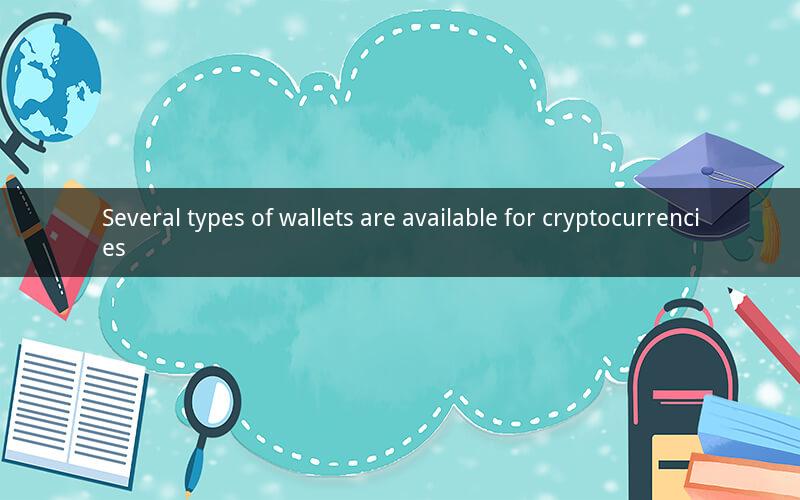
Table of Contents
1. Introduction to Cryptocurrency Wallets
2. Types of Cryptocurrency Wallets
2.1 Hardware Wallets
2.2 Software Wallets
2.2.1 Desktop Wallets
2.2.2 Mobile Wallets
2.2.3 Web Wallets
2.3 Paper Wallets
3. Security Considerations for Cryptocurrency Wallets
4. How to Choose the Right Cryptocurrency Wallet
5. Conclusion
1. Introduction to Cryptocurrency Wallets
Cryptocurrency wallets are essential tools for managing digital assets like Bitcoin, Ethereum, and other altcoins. As the popularity of cryptocurrencies continues to grow, so does the variety of wallets available. In this article, we will explore several types of wallets that cater to different needs and preferences.
2. Types of Cryptocurrency Wallets
2.1 Hardware Wallets
Hardware wallets are considered the most secure option for storing cryptocurrencies. They store private keys offline, which makes them immune to online threats like hacking and malware. Here are some popular hardware wallets:
- Ledger Nano S
- Ledger Nano X
- Trezor Model T
- Trezor Model One
2.2 Software Wallets
Software wallets are digital applications that allow users to send, receive, and store cryptocurrencies. They are more accessible and convenient than hardware wallets but may be less secure. There are three main categories of software wallets:
2.2.1 Desktop Wallets
Desktop wallets are installed on a computer and offer a higher level of security than web wallets. Some popular desktop wallets include:
- Bitcoin Core
- Electrum
- Exodus
2.2.2 Mobile Wallets
Mobile wallets are designed for smartphones and offer convenience and accessibility. They are suitable for small amounts of cryptocurrency and are generally more secure than web wallets. Here are some popular mobile wallets:
- MyEtherWallet (MEW)
- Trust Wallet
- Atomic Wallet
2.2.3 Web Wallets
Web wallets are online services that allow users to store their cryptocurrencies in the cloud. They are the most convenient option but also the least secure. Popular web wallets include:
- Coinbase Wallet
- MetaMask
- Blockchain.com Wallet
2.3 Paper Wallets
Paper wallets are physical documents that contain private and public keys printed on them. They are considered secure because they are not connected to the internet, but they can be damaged or lost. To create a paper wallet, you can use online tools like BitAddress.org or BitcoinPaperWallet.com.
3. Security Considerations for Cryptocurrency Wallets
When choosing a cryptocurrency wallet, it is essential to consider security features like:
- Multi-factor authentication
- Backup and recovery options
- Cold storage capabilities
- User-friendly interface
4. How to Choose the Right Cryptocurrency Wallet
To select the right cryptocurrency wallet, consider the following factors:
- Security needs: Determine whether you require offline storage or a web-based solution.
- Accessibility: Decide if you prefer a mobile, desktop, or hardware wallet.
- Ease of use: Choose a wallet with an intuitive interface that meets your skill level.
- Fees and transaction speed: Consider the costs associated with sending and receiving cryptocurrencies.
5. Conclusion
Several types of wallets are available for cryptocurrencies, each catering to different needs and preferences. From hardware wallets to software wallets, users can find a solution that best suits their requirements. By considering security, accessibility, and ease of use, individuals can choose the right cryptocurrency wallet to manage their digital assets effectively.
Questions and Answers
1. What is a cryptocurrency wallet?
- A cryptocurrency wallet is a digital tool used to store, send, and receive cryptocurrencies like Bitcoin and Ethereum.
2. Why do I need a cryptocurrency wallet?
- You need a cryptocurrency wallet to securely store and manage your digital assets.
3. Are hardware wallets more secure than software wallets?
- Yes, hardware wallets are generally considered more secure as they store private keys offline.
4. Can I use a mobile wallet to store large amounts of cryptocurrency?
- While it is possible, mobile wallets are not the most secure option for large amounts of cryptocurrency.
5. What is the difference between a desktop wallet and a web wallet?
- Desktop wallets are installed on a computer and offer higher security, while web wallets are online services that may be less secure.
6. Can I use the same wallet for different cryptocurrencies?
- Some wallets support multiple cryptocurrencies, but others are designed specifically for a single type of cryptocurrency.
7. How do I create a paper wallet?
- You can create a paper wallet using online tools like BitAddress.org or BitcoinPaperWallet.com.
8. What should I do if I lose my cryptocurrency wallet?
- If you lose your cryptocurrency wallet, you may lose access to your digital assets. It is essential to have backups and recovery options in place.
9. Are there any fees associated with using a cryptocurrency wallet?
- Some wallets may charge fees for transactions, but others are free to use.
10. Can I recover my cryptocurrency if I forget my wallet password?
- If you forget your wallet password, you may lose access to your cryptocurrency. It is essential to keep your password secure and backed up.